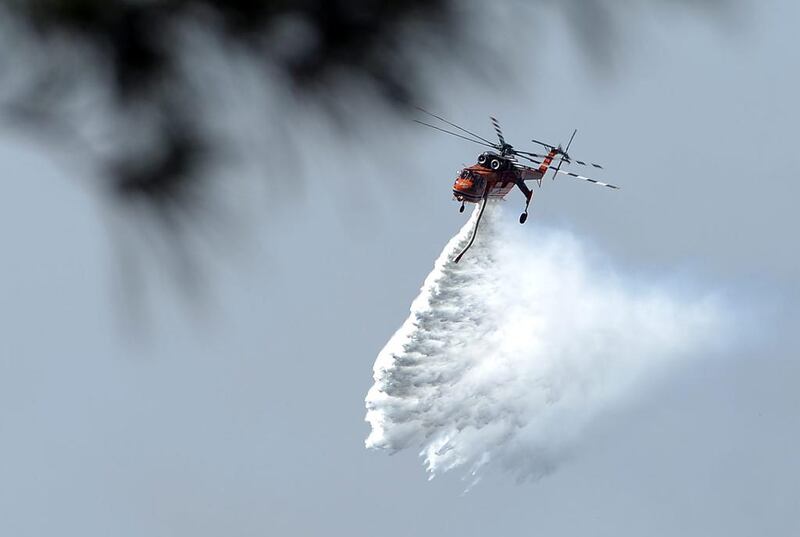WINMALEE // Ron Fuller is gazing at a jumble of rubble and corrugated iron — all that remains of the family home he built in the Blue Mountains hamlet of Winmalee 23 years ago. “We had a massive verandah, and we pretty much lived out there, in among the bush,” he recalls.
A week ago, the three-bedroom house was destroyed by a major bushfire, one of scores that flared up around New South Wales, claiming more than 200 homes. In the Blue Mountains, west of Sydney, the worst affected region, locals barely had time to catch their breath before the return of dangerous conditions this week.
Yesterday, as thousands of firefighters struggled to keep the flames at bay in baking heat and winds of up to 100 kph, another battle was being waged: a political row about the links between climate change and these unseasonably early fires.
Bushfires are part of the rhythm of life in Australia, with its highly flammable native flora. Aboriginal people used to burn the landscape to flush out prey, and promote new growth.
While fires are at their worst in the summer, from December to February, it is not unheard-of for the bush to burn in spring. What is unusual — unprecedented, say some — is the magnitude of the latest blazes. In the Blue Mountains, mammoth fires with combined fronts of several hundreds of kilometres have been raging uncontrolled for over a week.
Most scientists agree that southern Australia is becoming hotter and drier, creating tinderbox conditions in the bush. Although reluctant to blame a specific bushfire on climate change, they say that extreme weather events — such as the recent searing temperatures and high winds — are becoming more frequent and intense.
At the political level, there is no consensus. Last week, the deputy leader of the Australian Greens, Adam Bandt, was accused of “politicising” the fires when he warned that the policies of Tony Abbott’s conservative government would lead to more such conflagrations in the future.
However, on Tuesday — in a rare example of a United Nations official intervening in domestic politics — the executive secretary of the UN Framework Convention on Climate Change, Christiana Figueres, described the Australian fires as an “example of what we may be looking at unless we take … vigorous action” to combat climate change.
Mr Abbott, whose government was elected last month, has vowed to scrap a carbon price introduced by his Labor predecessor. He has also axed the Climate Commission, an advisory body, which released a report earlier this year blaming “a climate on steroids” for a summer of record-breaking heatwaves, severe bushfires, cyclones and floods.
Yesterday the prime minister hit back at Ms Figueres, accusing her of “talking through her hat”. He said: “Fire is part of the Australian experience … It has been since humans were on this continent.” The fires, Mr Abbott added, were “just a function of life”.
While Ron Fuller lost all his possessions in last week’s fire, his family escaped unharmed. His 19-year-old son, Harry, was the only person home; seeing flames in the picturesque Grose Valley, which the house overlooked, he grabbed his bass guitar and fled.
Sifting through the ruins earlier this week, in the vain hope of finding his wife’s jewellery, Mr Fuller said he would not consider leaving the Blue Mountains, despite the fire risk.
“It’s no different to living in a floodplain — you know a flood’s going to come through some time,” he said. “If you live in the bush, you know the bush is going to burn some time.”
Although only one person has died in the current fires — a 63-year-old man who had a heart attack while defending his home — some experts fear they bode ill for the coming summer.
David Bowman, a professor of forest ecology at the University of Tasmania, told ABC television: “It’s no big deal to have a fire in October, but to have one that has burned like this for more than a week at this level of intensity is unprecedented … It’s terribly worrying that we’ve got these fires starting this early in the season, because we’ve got to get through a summer yet.”
Like their US counterparts, Prof Bowman said, Australian firefighters were reporting larger and more aggressive fires than they had confronted in the past.
Andy Pitman, director of a climate change research centre at the University of New South Wales, told the ABC that the latest fires followed an “enormously warm [winter] in part due to global warming, leading to an environment particularly conducive to fire”.
foreign.desk@gthenational.ae





